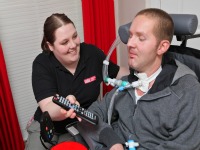
Image: Ark Complex Care senior care assistant and client Matthew Leadbitter
Home care providers must train up their workforces to support the rising number of clients with complex care needs, says Rebekah Newton, clinical director at Ark Complex Care.
The number of people with more complex care needs is rising and many are choosing to have their needs met at home, fuelling a need for more home carers with specialist skills.
Dementia, multiple sclerosis, muscular dystrophy, cerebral palsy, stroke, spinal cord and brain injury are among the conditions that form part of the complex home care caseload. Responding to this requires in-depth client assessment, highly skilled nursing supervision allied to flexible and ‘on tap’ training provision.
First, you need to recruit the right people to deliver complex care. Ark looks for sociable, outgoing carers who are good communicators with a flexible approach to their working hours and a willingness to travel. These attributes must be coupled with a determination to develop a long-term career in care.
An NVQ level 2 or 3 in health and social care, a national diploma in health & social care or several years’ caring experience is a minimum requirement. However, for more senior positions a nursing degree or significant intensive care unit nursing or community nursing experience is essential.
Home care providers will need to invest in training and development, and work in partnership with other agencies including the NHS, training companies and colleges to develop excellence in the delivery of knowledge and information. At the same time, collaboration between providers and commissioners will ensure that training opportunities for home care workers are based on the needs of individual clients.
All carers receive five days’ induction training when they join Ark and then an ongoing training programme is developed for each carer tailored to the needs of the person they will be caring for. For example, this could be training in ventilator and tracheotomy care, sectioning, bowel and bladder, autonomic dysreflexia and Percutaneous endoscopic gastrostomy (PEG) management.
Training programmes and strategies will need to take account of the range of specialist areas covered by complex care and the varying levels of training that will be required. Home care workers will need to have the agility and ability to adapt, learn and work across new areas of service delivery and possibly geographical boundaries.
The vast majority of Ark’s training is delivered in-house, with only 20% of Ark complex care training currently outsourced. During the next 12 months this will reduce further due to the expansion of the company’s in-house training programmes. Ark aims to deliver all of its own training thereby ensuring the most pertinent skills are developed for the desired outcomes of each individual client.
Options for further education qualifications include higher level healthcare diplomas and apprenticeships. In addition, there is a raft of complex care specialist training courses available
With induction training, clinical client specific training and shadowing, Ark spends on average 14 weeks training staff for specific client care. This does vary depending on the complexity of the client’s needs.
There is a responsibility too among care providers to promote the home care and complex care professions which offer rewarding career opportunities and vital skills and expertise, the demand for which is unlikely to diminish in the future.
Ark offers care positions with clearly defined levels of responsibility. For example, a carer can progress to become a senior carer, team leader, care manager and then senior care manager. Staff appreciate the Ark philosophy that strongly advocates continual career development; people beginning their careers at Ark are motivated by seeing others exactly like them progressing to more senior positions within the company.
This desire to purpose a career path, coupled with the availability of the right training necessary to progress, is ensuring the company attracts and retains the best staff. The company does not provide financial incentives to take additional qualifications, however it does fund the cost of certain external courses such as national diplomas.
Related articles
Training good care workers for the future


 ‘Dear Sajid Javid: please end the inappropriate detention of autistic people and those with learning disabilities’
‘Dear Sajid Javid: please end the inappropriate detention of autistic people and those with learning disabilities’ Ofsted calls for power to scrutinise children’s home groups
Ofsted calls for power to scrutinise children’s home groups Seven in eight commissioners paying below ‘minimum rate for home care’
Seven in eight commissioners paying below ‘minimum rate for home care’ Children and young people with SEND are ‘valued and prioritised’ in Wiltshire, find inspectors
Children and young people with SEND are ‘valued and prioritised’ in Wiltshire, find inspectors 
 Facebook
Facebook X
X LinkedIn
LinkedIn Instagram
Instagram
Comments are closed.